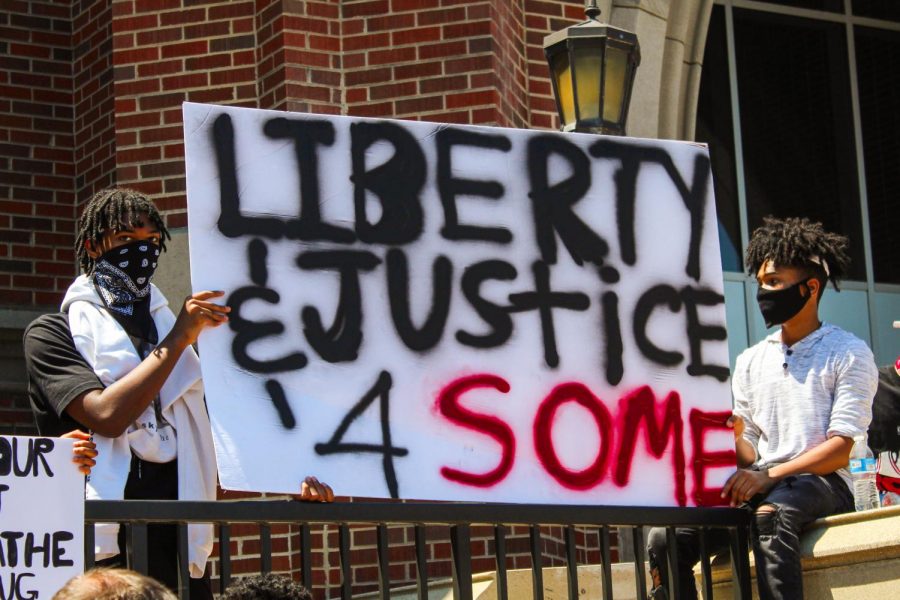Staff Editorial: Black History Month renews our fight to prove that racism is not political
THE FIGHT FOR EQUALITY: two young men hold a sign reading “Liberty and Justice 4 Some” at a BLM march in Downers Grove last summer.
February 6, 2021
This month, you may see the beginning of an influx of race-related stories on our website. In doing so, we seek not to demote the vast, detailed history of Black Americans into just one month but rather, in the words of the National Civil Rights Museum’s Noelle Trent, recognize Black History Month as a “starting point” from which we can reinvigorate and build upon our appreciation and celebrations of Black culture and people in this country.
Despite progressive advancements made with the goal of establishing ethnic and cultural equality, racism is still rife throughout our community just as it is throughout our country. Moreover, the principle of racial equity, something that has been and should be uncontroversial, has slipped through the cracks, falling from the grace of unanimity to the chasms of political divide.
In writing stories capturing the accomplishments, history, and experiences of Black Americans as well as the work left to be done and the problems that still persist, we are not conforming to a narrative. We are not attempting to indoctrinate. We are not presenting a political bias. We are not creating and expanding upon an agenda. We are attempting to inform; to expose to our audiences both the beautiful history and accomplishments as well as the horrific problems and injustices of Black experiences, past and present. There are clear disadvantages that minority communities live with in this country, so becoming informed about the injustices they face as well as recognizing and appreciating their cultures is the least we can do to improve in our attempts to all understand and appreciate one another.
A key aspect of this month is “learning,” and not all of that is reading off of a fact sheet. The most important elements of learning in this sense are to listen, to learn from mistakes, and to understand the basis of the fight for equality. Many have made mistakes, uttered insensitive comments, or had misconceptions about ethnic minorities, but taking the time to learn from those mistakes and understand why they’re wrong is absolutely critical in the push towards eliminating discrimination.
On a similar note, we recognize our lack of diversity as a staff and acknowledge that the majority of us will never understand what it means to be a person of color. That same element of learning is crucial for us in our path to understanding, expressing, and giving voice to those people who desperately need to be heard.
There is a line in the sand for what a journalist should and should not consider unequivocal. That is, there are many things that, while most may feel one way or another about them, journalists should not take a side on. We are confident in saying that racial equality is not one of them. We affirm that, through learning from conversations with those who have lived its evils, racial discrimination should not be considered in the same realm of bias as taking a stance on political matters.
This Black History Month, we seek to build upon our base of giving that voice to those who may feel they don’t have one, which often includes the stories of Black Americans. We seek to take part in the dissolving of racial discrimination as an arguable political topic and the reestablishment of it as an indisputable truth and a problem that requires all of us to solve.
























